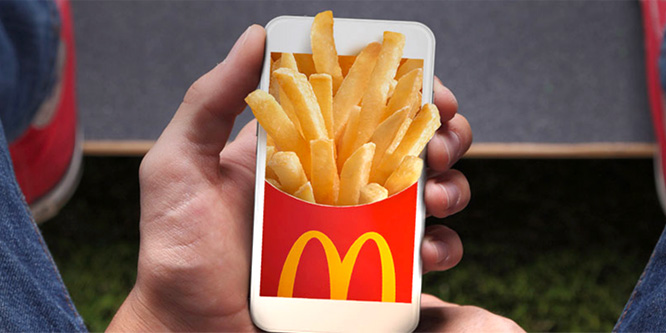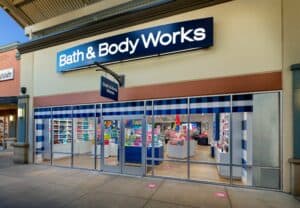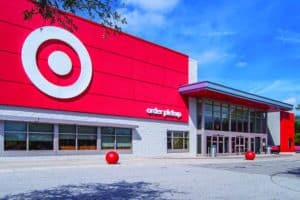
Source: McDonald’s
July 23, 2018
McDonald’s offers free fries for mobile orders
McDonald’s is offering free fries every Friday for the rest of the year for spending at least $1.00 through its mobile app.
The promotion is apparently designed to encourage consumers to download, register and get comfortable using its app. The chain is fielding a similar free-soda promotion on Tuesdays and Thursdays.
McDonald’s enjoys labor savings on mobile orders since they’re sent straight to the kitchen.
Helping shoppers skip lines and avoid waits, mobile ordering also promises to improve the dining experience if McDonald’s can make it part of customers’ regular routine. Peter Saleh, a restaurant analyst for BTIG, told CNN that once customers “start using [the app] and get into that habit, it tends to stick.”
Steve Easterbrook, president and CEO of McDonald’s, said that mobile app usage is key to correlating and capitalizing on customer data when he spoke at Bernstein’s Annual Strategic Decisions Conference in May.
With over 20 million registered users in the U.S., the mobile app is also key to engagement. The app further supports a “one single ecosystem” for customers, whether they use drive-through, self-order kiosk, mobile auto pay, home delivery or the traditional counter. Said Mr. Easterbrook, “They want to be treated as that one individual, so we always have to blend the technology platforms so that we can engage with them in one compelling way.”
Business Insider Intelligence predicts that by 2020, mobile order-ahead will account for 10.7 percent of all quick-service restaurant (QSR) sales.
In May, Starbucks extended its mobile app and pay, formerly only available to rewards members, to non-members via an e-mail submission. The coffee chain said the move supported personalization efforts.
“When it comes to how a retailer focuses on the customer, we see too many examples of businesses choosing between an experience that solely focuses on convenience or one that simply highlights community,” said Kevin Johnson, president and CEO of Starbucks, in a release. “But we don’t believe there needs to be this type of a tradeoff, and our third place can and will continue to unite both experiences.”
- McDonald’s is giving away fries for the rest of the year … if you spend $1 on its app – CNN
- McDonald’s is giving away free fries every Friday. Here’s how to get some. – Business Insider
- Steve Easterbrook Presents at Bernstein 34th Annual Strategic Decisions Conference 2018 (Transcript) – Seeking Alpha
- Starbucks Aims for More Mobile Orders – The Wall Street Journal
- Starbucks CEO Kevin Johnson Unveils Innovation Strategy to Propel the Company’s Next Decade of Growth at Starbucks 2018 Annual Meeting of Shareholders – Starbucks
- Starbucks ceo Kevin Johnson Unveils Innovation Strategy to Propel the Company’s Next Decade of Growth at Starbucks 2018 Annual Meeting of Shareholders – Starbucks
Discussion Questions
DISCUSSION QUESTIONS: How important is it for QSR establishments to encourage mobile ordering and payment? Where do you see the obvious and less obvious benefits of increasing the frequency of mobile app use?
Poll
BrainTrust
Nikki Baird
VP of Strategy, Aptos
Recent Discussions








From what I’ve heard from QSR restaurants that have invested in mobile ordering, it’s totally worth it. It keeps the lines down, it makes the incoming orders a little more predictable (especially if you can get them to order well in advance of arriving), and the upsell opportunities alone pay for the software and implementation.
Taco Bell, somewhere, reported that consumers were adding on things that they had to pay for — like guacamole or sour cream — at far beyond the rate they were adding them in stores. I remember them saying at the time (though it could’ve been another one, it’s been a little while) that it wasn’t just employee training or any kind of language or accent barrier or anything like that — it was really the pressure of the line behind the customers that made them just “go basic” at the register in a way that they did not repeat when using their phones and having no one standing behind them.
And if you can get customers to set up highly customized orders that they then repeat with frequency… those become much higher-margin customers than anyone who walks through the door and just orders “a number one” and that’s it.
Great points, Nikki. In-store ordering from menu boards has developed its own level of confusion and so the “audience of one” mobile menu is attractive because of the browse and selection experience. The ability to save some time and get free product makes it even more attractive. Mobile is good for the customer and good for the brand.
Totally makes sense. I was going to comment about a potential decrease in impulse sales as a downside (i.e. giving in to the pastry display at Panera), but after reading your Taco Bell story I think that certainly depends on the level of upsell customizations available – as it might actually end up being an up-side depending on how add-ons are framed up to the mobile consumer!
QSRs all need to push customers to mobile. Usage creates habits and it is important to get customers to download your app BEFORE they think they need it.
Mobile is not the future. It’s the present. Habit is spelled “mobile USAGE.”
QSR restaurants are about speed from ordering, receiving your meal and getting out. So I think the mobile app is a good move for McDonald’s because it adds convenience. Often standing in line at a McDonald’s is the most annoying part of the process and the app will reduce that. The app will not do much for the in-restaurant dining experience because the more we reduce or eliminate human interaction, the less potential there is for a strong customer experience. However, for the QSR world, this type of convenience is a good move. I would expect other QSR restaurants to follow.
First there was the counter, then the drive-thru and now ordering on the go. With mobile payments, there are two barriers to success that instantly come to mind for QSR.
The first and most important is the user experience (UX) because it won’t matter how good those free fries are if it takes 15 minutes and assistance from the manager to put your order in.
The second is security; as mobile payments continue to grow QSR must protect their consumer’s payment info and the moment the consumer’s information is stolen they will put away their phones and stick with the cash register.
If QSRs can get the mobile payments down their profits should get a nice bump. With fast food, it’s all about getting to as many consumers as possible in the shortest amount of time while delivering a high standard of service.
Brilliant. Free fries will translate to increased app downloads and mobile order engagement. McDonald’s has a point of difference where they can lead with a much larger average mobile transaction. I would love to see how families capitalize on this convenience.
Free is the magic word in retail. This long-running promotion will recruit new app users, grow McDonald’s database for current and future use and drive visits. Given the cost of acquisition of users this will seem like a bargain in the long run.
Incentivizing mobile purchasing is a great way create habits with the target market to use the app across multiple channels. Starbucks was a pioneer in creating a “need” for the customer to use the app (earning points, advance ordering, simple payment process, etc). The challenge for the end-user is which apps stay on the mobile device and which ones don’t make the cut (for a variety of reasons). Users can only juggle so many apps which means McDonald’s need to make sure the process is seamless, simple and serves the needs of the customer. Otherwise, a year of free fries still won’t make the cut.
I’m glad to see companies such as McDonald’s offering true incentives for mobile app use. Too often we see apps created for apps’ sake, with little value add to the consumer. I think this will do a lot to decrease their outlay while boosting revenue, and all for the cost of a few fries which is minimal.
Mobile ordering can improve the customer’s experience, for all the reasons mentioned in the article. And how do we get customers to use mobile ordering? We give them an incentive to do so. Free fries is an amazing incentive for McDonald’s. The airlines gave their customers/passengers frequent flier miles for using online services. Eventually there was a tipping point, and it made sense for both airlines and customers. The same time thing can happen in QSR establishments.
This is a good idea for McDonald’s, but it isn’t just about mobile ordering. It’s about opening up a near real-time communication channel with customers. Being digitally connected with customers creates the groundwork to merge online and in-store experiences more seamlessly in the future.
Starbucks was the pioneer here and, similar to Bezos’s premise that it is fiscally irresponsible to not have Amazon Price, their app makes it so simple (and rewarding) to use their app. It’s extremely important, as others have mentioned, to promote use BEFORE getting into the store. By getting consumers used to experiencing a QSR via mobile, it changes behaviors in a more impactful way.
Conversion/acquisition has always been top of mind for any marketer, but it’s becoming more relevant in QSR as competition heats up and “online ordering” becomes table stakes.
Many retailers/restaurants are rethinking their loyalty strategies to make them more intriguing, experiential, and rewarding. But that is relevant only in post-acquisition engagement. I love the simplicity of McDonald’s approach here and given that frequency (and basket size) or online orders are significantly higher than in-store, the ROI should be sizable.
It’s critical for QSR to establish mobile ordering. McDonald’s has spent a lot of effort in streamlining their order system with Kiosk at the store, mobile ordering, and uber-deliery. It’s not just an operational issue, the Millennial and Zillennial consumer favors mobile and other systems designed to save time. The benefits might not be immediate, but it will pay large dividends sooner than later.